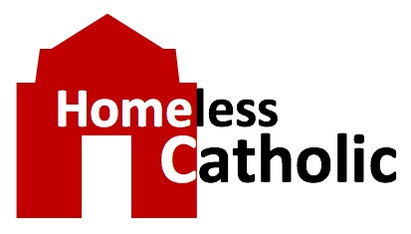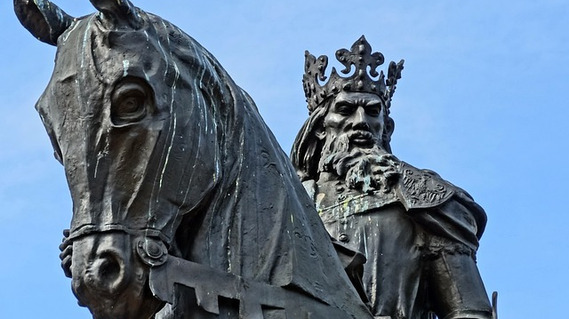Only one could be king
Jesus is the only king Americans could ever accept. We understand the frailty of our leaders, and properly assign them as servants of the republic. They are not kings. They are not gods. We, and they, are only temporary stewards. We are in a unique position as deniers of monarchies, rejectors of dictatorships, and warriors against despots. Some of us grasp that only the one true God could rule us. We Christians believe God will be revealed in the glorified return of Jesus Christ. Only he could be our king.
The king is coming
http://www.usccb.org/bible/readings/111616.cfm
RV 4:1-11
LK 19:11-28
Our nation’s pre-colonial history tells us that our ancestors included the paleo-Indians of North America who migrated from Asian lands beginning anywhere from 20,000 to 15,000 BC. These folks hiked to our continent across receding tracks of glaciers, eventually populating almost every square mile of our countryside. This migration continued to take place within our continent as folks spread south and east to stake out new tribal lands. They left the rule of others to rule their own lives.
Migrations next came from Scandinavian seamen in 1,000 AD, who dotted coastal campsites above the Northeastern tip of Maine. Who knows, yet, the others who traveled here over the next 500 years until Italian explorers funded by Spain pulled ashore near the Bahamas, continued onto Cuba and Haiti. Eventually, the Italians made our continent near Panama and Venezuela in the late 15th Century, opening the door to Atlantic travel routes. These were fearless entrepreneurs, searching for trade routes and new opportunities for wealth. They desired a prosperity of their own.
Florida met our first Europeans, the Spanish, who made excursions here from 1513 to 1565 when the city of Saint Augustine on the panhandle was founded. An English trading company formed Jamestown, Virginia in 1607. The Dutch arrived in 1609. English pilgrims landed in Massachusetts in 1620 and by then the English and French populated a host of places until the mid-18th Century when the French Indian war finally organized our Spanish, British and French history of service to the kings and monarchies of Europe across North America. The explorers crawled across our land to partner with, subsume, and eventually conquer the natives. The conquerers desired recognition for expanding the breadth of their home kingdoms.
Our colonial ancestors served under three European kingdoms under one empire. The British, specifically the Stuarts and the House of Hanover, rules parts of North America from 1660 to 1776. No less than six British kings and two queens ruled our lands during that time. The French ruled the Louisiana lands until 1803 under the kings of the House of Bourbon. The Spanish kingdom ruled vast properties from the west and south, and included kings from the houses of Habsburg, Bourbon, Bonaparte and Savoy.
A revolution then removed our lands from any kingdom rule. When finally Texas and California were named among our nation's territories, the monarchies had been turned back. The colonists had searched for new lands they could claim as their slice of a new kingdom, ruled by no foreign or domestic royalties.
Since that time, our population has grown from those who have escaped a myriad of monarchs, and three hundred years of dictators and despots across the globe. Our people are a genetic amalgamation of migratory tribes, seamen, explorers, traders, pilgrims, wanderers, convicted criminals, slaves, exiles and refugees, all seeking land and sanctuary for both survival and lives free of tyranny.
Our nation’s first slogans of freedom, which eschewed kingdoms and kings for a republic, declared boldly “Don’t Tread on Me,” and “Live Free or Die.” Our nation to this day does not cater to, desire, nor appreciate rule by a king. We are the sons and daughters of migrants and refugees made free, pilgrims and sojourners made free, and slaves made free. Most pointed was an insistence that we each live with individual religious freedoms. We discarded the rule of humans who pretend to be gods, and celebrities and elites who demanded our approval. We are subject only to each other, our laws and constitution, our own religious edicts, and our temporary elected officials. Our genetic composition and collaborative culture conclusively insists that we will have no king but our own God.
In the scripture in Luke Jesus describes a king that we don’t experience. By analogy, Jesus positions servants in the service to a master that we cannot understand; nor do we want to imagine. The handing out of coins to be invested by trade from the generosity of a landowner who control's our lives builds upon a premise we do not accept. The expectation that we would earn interest for the profit of another, who rules our existence from afar, forms the very basis for the revolution that excised us from Europe. The resulting slaughter of failed rather than disobedient servants rankles our moral grounding. Our nation continues to teem with escapees from both slaughter and servile work.
The behavior of servants who would go to such lengths for someone who rules over them, driven by fear, pains us. To the American culture, the cowering servant who buries his king’s gold in order to return it untouched appears more savvy than cowardly.
How do we, children of God and citizens of a democratic republic, make sense of Jesus’ parable couched in the frame of mind of servants and kings who have obtained their rule from a distant body? Perhaps the upcoming inauguration of a president that we may not have voted for might fit. Or, the assignation of a pastor that runs our parish might apply. These leaders are foisted upon us. Maybe even our own parental relationship of our mother and father during our teenage years might adjust our concept of king and servant. They are worthwhile comparisons to consider. Our objections to our president, our pastor, and even our parents have been rebuffed. We have often disavowed them, but there they stay.
The setting for Jesus’ parable within the Roman rule helps our understanding. “While people were listening to Jesus speak, he proceeded to tell a parable because he was near Jerusalem and they thought that the Kingdom of God would appear there immediately.” Immigrants to the United States often reflect on how they imagined immediate freedoms and prosperity as they stepped on our shores or crossed our borders.
The expectation of Jesus’ upcoming rule as the Messiah, consequent by his disciple’s grasp of his teachings over the past several years, meant that Jesus was about to enter Jerusalem and assume the reigns of rule. He was going to take the mantle of the King of the Jews in the same vein as David. The folks with him all had expectations of the Kingdom of God as an instantaneous apparition, a new administration of their lives. That, however, was not to be the case.
Our nation’s promise requires a leader that none of us would worship unless they were God himself. We continually seek fairness, balance, and prosperity, envisioned in a paradise on earth. In reality our society has waxed and waned under the turmoil of ideologies, experiments, and threats from others. Subject to no one on earth but ourselves, we wait for God.
Jesus entered Jerusalem, claimed his kingship, and and then left his followers behind with his person and spirit living within each one. In his physical absence, the kingdom would rely upon his assigned servants. Jesus was not going to be a political force in the form of a king that they knew. We have much the same difficulty as men and women of a democratic republic in understanding God’s relationship to us. So too did the Jewish people in their proxy rule from the Romans over the religious charge of the Sanhedrin. Jesus planted the parable to mirror their experience.
Jesus’ analogy regarding going to a foreign over-ruler to obtain his kingship fit the historical reality of the Jews. Herodian princes had traveled to Caesar to get their papers to be kings of the Jewish people. The Jews often objected to this leadership and had regularly sent word to Caesar. But, the decisions were made anyway. They were still assigned as kings over the Jewish people.
So, what do we do with the coin analogy and the eventual oddity of pleasing the king with measured success in investment or else suffer severe punishment? How does this fit our cultural reality, our melting pot citizenship?
The coins represent our God-given talents and our knowledge of and relationship to God, infused in us from the Holy Spirit. The commentators on scripture tell us that much. Our knowledge is expressed in the scriptures and teachings handed to us, and developed as doctrine over the ages. Our talents are ordered from our relationship with God. We are told by the parable that Jesus, our assigned king, expects us to trade in that information and those talents through a commerce in community. It’s more than just the information and gifts, really. We must live as a loving community. We must forgive. We must assist the weak. We do this by following the urging and voice of the Holy Spirit.
The underpinnings of our national democratic republic, our human society, was built upon our ancestor’s many practices and understanding of their faith. Their prayerful interaction with a benevolent and just God provides the foundation for the innumerable systems of commerce that make up our society. It’s not a far stretch at all to see God included in every aspect of our nation’s progress. Subsequently, all of us, across a myriad of religious expressions, have been given golden nuggets of both talents and information that must be exercised, exchanged, and built up. Our presence as a beacon of God’s pleasure and relationship to us should not be hidden, ignored, or discarded. We are more like the Jewish nation that we may realize.
While the number of folks in our society, a nation “under God,” do not accept the premise, the premise is acceptable anyway. We await the return of a king that comes later. Jesus' parable explains that if we reject the expectations ofJesus the Christ as our king when he comes we will suffer a necessary eradication, because there is only one kingdom. Refusing to serve the king who loves us means an exile without freedom. Our nation is just one of many nations, few who owe their eventual fealty to a returning king.
That means all nations, and all of us will bow before him on his return. Until he returns many will choose to disregard the premise. They don't believe it, or don't want to arrange their lives under an expectation of living a life led by the Holy Spirit.
In fact, Jesus is the only king Americans could ever accept. We understand the frailty of our leaders, and properly assign them as servants of the republic. They are not kings. They are not gods. We, and they, are only temporary stewards. We are in a unique position as deniers of monarchies, rejectors of dictatorships, and warriors against despots. Some of us grasp that only the one true God could rule us. We Christians believe God will be revealed in the glorified return of Jesus Christ. Only he could be our king. Non-believers will benefit from this reality, if we maintain the foundation of our nation and courageous ancestors. Believers continue to pray that this will be so for all of us.
Because the king has been named, and he is coming. Our ancestors watch to see what we will do.

